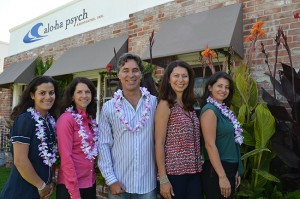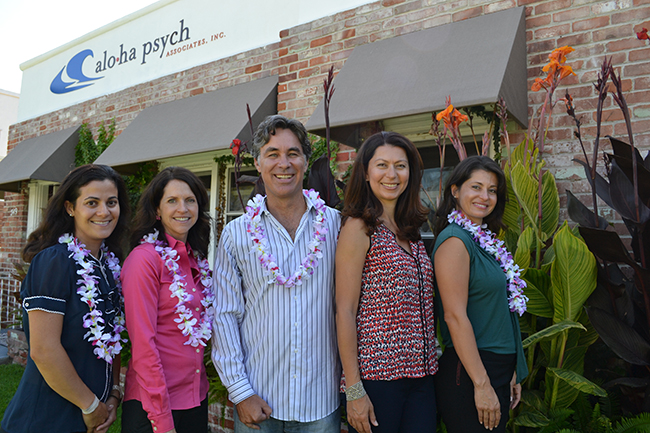When Dr. Sean Hodges was seeking a name for his Coronado-based center of health psychology that opened last November, he looked to the Hawaiian language for inspiration and came up with a two-word phrase: “Alo,” meaning presence and “ha,” which means breath.
“As a bonus, the words combine to form ‘aloha’ which holds many meanings including peace, passion, mercy and ease,” said Hodges, “Those are all attributes we want to help our clients achieve.”
“We” refers to Hodges and three associates who are based at Aloha Psych’s counseling center at 549 Orange Ave. They include Jada Cade, a clinical and consulting psychologist and Laurie Chapman, a licensed marriage and family therapist, and the newest associate to join the practice, Dr. Danielle Nahas. Both Chapman and Cade live in Coronado.
Dr. Nahas is a licensed educational psychologist and board-certified behavioral analyst who evaluates and treats children and adolescents with learning, behavioral and emotional challenges. Dr. Nahas, who has worked as a school psychologist within public school systems, regularly conducts independent assessments on learning disabilities, which can be presented to appropriate school districts for action.

Hodge’s wife, Lillian, serves as office manager. The Hodges and their two children, Isabella, 10, and Sophia, 7, live in Coronado.
Also of counsel to the practice is psychiatrist Robert Zaragoza for psychopharmacology referrals.
Hodges is a clinical psychologist who also holds a masters in psychopharmacology. Over the past 10 years, he has built a specialty in geriatric psychology, but works in all areas and with all age groups for psychological counseling.
Aloha Psych’s specialty is health psychology applied to medical problems, said Hodges.
“It’s estimated that 70 to 90 percent of medical problems — heart disease, obesity, diabetes, chronic pain, you name it — is stress related,” Hodges said. “Our society has bought into the concept of “Big Pharma” — the idea that you just take a pill to feel better. But taking pills sometimes just masks the problems, which can then intensify.”
Instead, he and his associates employ a number of therapies that can help a person become more self-effective. “Cognitive and behavioral therapies can help a person become more aware of patterns in thinking that maintain negative feelings and behavior and negative body responses,” Hodges explained. “Then we help them go about the process of creating thoughts that are more adaptive, more accurate and can help a person be more at ease.”
Additional services include pain management and chemical dependency counseling.
Hodges grew up in Oceanside. An avid surfer, he gravitated south and lived for a time in Imperial Beach. During his young adult years, Hodges worked with his father in his physical therapy office where he found that he was most interested in observing and helping patients adjust to their injuries from an emotional, rather than physical, standpoint. At the University of Hawaii, which offered a unique integrated program of medicine and psychology, Hodges earned a bachelor’s in psychology, graduating second in his class. He received his doctorate in psychology at California School of Professional Psychologists. He also holds a master of science in clinical psychopharmacology and frequently consults with other physicians on pharmacology.
Hodges is affiliated with three hospitals. He is on staff at Sharp Coronado Hospital, Sharp Mesa Vista in San Diego and Paradise Valley Hospital in National City. He is also licensed in Hawaii, where he plans to open a second practice with an associate in the not too distant future. Over the past decade, Hodges has developed a geriatric specialty, working with San Diego-based patients in hospital settings, nursing homes and outpatient facilities.
He has worked with clients who have presented cases of depression. Of the recent death of actor and comedian Robin Williams, Hodges, like all of America, was deeply saddened. He said it was not surprising that Williams was widely regarded as “one of the nicest people you’d ever want to meet.”
“People with depression will often work hard to please others instead of looking out for themselves out of fear of disappointing,” he said. “Depression can change your body chemistry and things can go out of whack. Sometimes people will try to self-medicate with drugs or alcohol.
“They can get tired and angry and frustrated,” he said. “Suicide is usually an act done out of frustration, not necessarily sadness.”
Hodges noted that the highest-risk demographic for suicide is older men, followed closely by teenagers.
According to the Centers for Disease Control and Prevention (CDC), the elderly were the most at-risk group for suicide, but as baby boomers have entered middle age over the past decade, the 45-to-64-year age group (Williams was 63 at the time of his death) has surpassed them. In 2011, there were 39,518 suicides, compared with 32,367 deaths in car crashes in the United States, according to the CDC and National Highway Traffic Safety Administration.
Anxiety disorders are more common than depression, Hodges noted.
“Anxiety is like having adrenaline on 24 hours a day,” he said. “Over time the body starts wearing out and that can lead to depression.”
Anxiety, he noted, can often be traced to growing up in a high conflict environment and can cause the nervous system and endocrine system to become deregulated. “A person suffering from anxiety is working with an endocrine system that is conditioned to be over-aroused,” Hodges said. “The good news in all of this is that these are fixable problems.”
“The consequences are that you not only feel better emotionally, but it affects the rest of your body — you are improving your overall health.”

